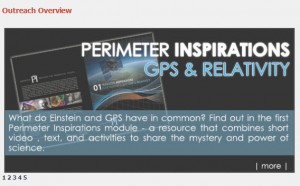Canadian Teens Do Not Like Science or Do They?
Today a Newsletter from the Perimeter Institute happened to cross my desk (I should have said crossed my Desktop). With a great interest I read an article by Dr. Greg Dick who is one of Perimeter Institute Outreach Managers involved in Perimeter Institute for Theoretical Physics Outreach events. In his note, Dr. Dick discusses the results of the November 2010 survey by Angus Reid that probed Canadian 16-18 year old teens. The survey aimed at measuring their attitudes about science. In this survey, 4% of 502 teens declared scientists to be cool and much of the media used this argument as Canadian teens’ negative perception of science. I agree here with Dr. Dick that being cool and liked is not the same. Having two teens at home, I know that many things they consider to be cool today (I even do not want to mention their clothing fashion are not something they like or will like in a week or so. However, I somehow disagree with some of the result interpretations by Dr. Dick. I interpreted the results somewhat differently. For example, one third of all Canadian students are considering to take a science course in college. It doesn’t mean that they will chose science as a career – taking a science course in my view should be something all of our students HAVE to take and maybe not only one science course but a few. It is something we might view as science literacy. I am not talking about higher level science courses. I mean science courses for general students that will help them become aware of what is going on in science today and what impact it has or might have on society we live in. This becomes even more important at times where most of our students will be able to vote for the next Canadian government. Should it support science? It would be interesting to know how many of our government officials consider science to be cool (I presume adults also use this term). How can we have an opinion on global warming, climate change, genetically modified foods or stem cell research if we have never taken A SCIENCE COURSE beyond high school? I think science literacy, like language literacy, should be benchmarks of post-secondary education. For me, it is not enough that only 1/3 of our students will have an informed opinion about science. I think we all should. However, here there is another question. What are the outcomes of popular science courses? Do our students gain basic science knowledge as a result? Who teaches these courses? Are they effective? What if students hate science more after they take these courses? I think general science courses are extremely important and in my view people who teach them have a much more important job that the faculty who teach physics for physics or even for science majors. This is often our last chance to sway our general students towards science and leave them with positive memories of science… and scientists… Many of these students will become teachers, business people, lawyers, politicians. Should all of them have at least one good science course?
I appreciate a lot the work done by the Perimeter Institute (I was fortunate to take part in some of the events and have heard lots of positive feedback from students and teachers). I am also a member of the American Association of Physics Teachers who invited Dr. Damian Pope to give a plenary talk during 2008 AAPT National Meeting and I was very happy to see Damian give an excellent presentation. However, I think there is much more to be done in Canada. One Perimeter Institute and a few other centers across Canada (for example TRIUMF here in Vancouver) are not enough for the country of 34 million people. We need to have elementary teachers who can teach science and who like it, we need to have science teachers at all levels who are competent and excited about science. We need to have all teachers and general public to have more favourable view of science… Interestingly, the more we depend on science in our daily lives, the more remote science become to many of us… And after all, I do think science is cool and exciting. The problem is to learn how to share our excitement about science with ALL CANADIAN students, not only with the ones who are lucky to live near the Perimeter Institute or to attend the amazing EinsteinPlus summer institute there, or to live in other big cities across Canada (Vancouver, Montreal, Toronto, Calgary, etc…) where lots of physics outreach opportunities are available… I think we are trying to excite students about science, but we still have a long way to go…
See my previous post.
